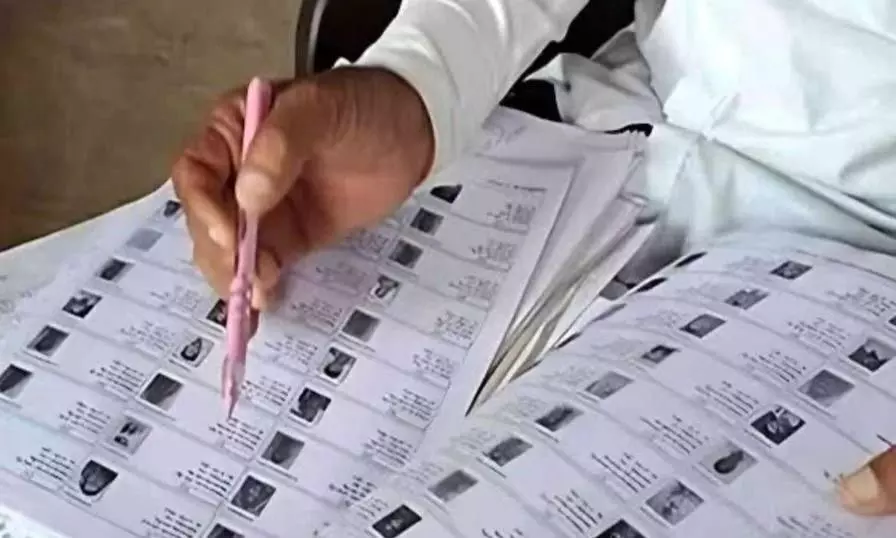
SIR in TN: DMK MP Elango slams EC, asks ‘Why special treatment for Assam?’
Elango claimed people have understood why the DMK is opposing SIR – because it is designed to snatch away the voting rights of genuine citizens

Strongly defending the DMK’s opposition to the Special Intensive Revision (SIR) of electoral rolls, senior party MP and advocate NR Elango on Monday (November 17) alleged that the Election Commission (EC) is deliberately creating hurdles to disenfranchise genuine voters in Tamil Nadu while adopting a softer approach in Assam. He also accused the AIADMK of welcoming SIR only to “wave the fan for the BJP”.
Speaking to reporters after monitoring the ongoing SIR work in Chennai, Elango said the Supreme Court has directed the EC to answer the questions raised by the DMK.
‘Huge confusion among the public’
“There is huge confusion among the public on how to fill the forms correctly. Chief Minister MK Stalin has instructed party cadres to assist people in filling these forms,” he said, and added that DMK booth agents across the state are actively helping voters complete the complicated documentation.
Also read: TN govt officials boycott SIR duties, announce ‘work stoppage protest’
Dismissing AIADMK general secretary Edappadi K Palaniswami's charge that the DMK was opposing SIR to protect bogus voters, Elango said, “EPS’s statements are far removed from truth. The AIADMK realised the problems in SIR only after extending full support to it. They are backing this exercise only to please the BJP and wave the chamaram (fan) for them. Even AIADMK cadres have now understood that their party’s stand is wrong.”
He claimed people have understood why the DMK is opposing SIR – because it is designed to snatch away the voting rights of genuine citizens.
BLOs given ‘just one day of training’
Drawing a sharp contrast with Assam, the DMK MP asked, “What is the difference between Tamil Nadu and Assam? In Assam there is only Summary Revision (SR), not Special Intensive Revision. Why this step-motherly treatment to Tamil Nadu?”
He further alleged that Booth Level Officers (BLOs) have been given just one day of training and sent to people’s doorsteps without proper preparation. “For conducting elections on a single day, the Commission considers festivals and several other aspects. But for voter list revision, such care is missing,” he said.
Also read: EC’s SIR drive ahead of 2026 TN polls triggers confusion, exclusion fears
The MP accused both the BJP and AIADMK of spreading false allegations against the DMK to divert public attention from the real issues in SIR process. “DMK will continue to highlight the complications and hardships faced by the public because of SIR,” he asserted.
Second phase of SIR
The EC launched the second phase of SIR of electoral rolls on November 4, 2025, in 12 states and Union Territories, including Tamil Nadu, covering over 51 crore voters.
This exhaustive house-to-house verification exercise, the first in Tamil Nadu in two decades, requires voters to fill fresh enumeration forms and, in many cases, trace family links to pre-2005 electoral rolls or submit documents to prove eligibility.
Unlike the routine annual Summary Revision, SIR effectively creates a new voter list from scratch, with draft rolls to be published on December 9, and final rolls on February 7, 2026, ahead of the 2026 Tamil Nadu Assembly elections.
The DMK and allies have fiercely opposed the process, terming it arbitrary, rushed (especially during the northeast monsoon), and prone to mass disenfranchisement of genuine voters, particularly from marginalised communities. The party has approached the Supreme Court, alleging it amounts to a “de facto citizenship verification” and violates voter rights. Protests were held across the state on November 11.
In contrast, the AIADMK and BJP have supported SIR, claiming it will remove duplicate and bogus entries to ensure clean polls. Assam, another poll-bound state in 2026 ruled by the BJP, is undergoing a lighter “Special Revision” (not full SIR) due to its unique citizenship provisions under the Assam Accord and the ongoing National Register of Citizens (NRC) process monitored by the Supreme Court.

